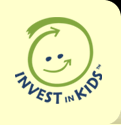Intellectual Development means being able to communicate, to think both creatively and abstractly, to pay attention, solve problems, and develop keen judgment and a lifelong readiness to learn. | Emerging Skills Better understand how to sort and classify objects by characteristicsBegin to understand the concept of "more" and "less"Become more familiar with different forms of measurement – height, weight, lengthRecognize and identify "bigger," "biggest," "small," and "smallest"Identify and name different coloursReplicate patterns, sequences and orderBegin to understand concepts of texture, weight, position and spaceBetter understand and recognize different shapesExperiment with cause and effectBuild large structures from blocksFind out more about What to Expect from your preschooler, 4 to 5 Years. |
|
Parents Can: Support their preschooler's exploration and curiosity about her physical environment | Child Will: Feel supported in risk taking and exploringUse her senses to discover properties and characteristics of things, such as those that float and those that sinkMake connections between prior knowledge and new connections
| |
Parents Can: Stretch their preschooler's creative thinking by asking questions such as "How many different ways can you move your hand?" "How many ways can you say your name?" and so on | Child Will: Feel supported to think about solutions from many perspectivesUse his imagination and creativity
| |
Parents Can: Help their preschooler discover something new everyday, such as a gardening tool, a carpentry item or a dry bean, and ask, "What can we use this for – what do you think?"Encourage curiosity by modeling it | Child Will: Enjoy the opportunity of learning new things with youLearn that the only way to learn about things is to ask and explore
|
| | |
Parents Can: Provide a variety of card games, for example, "Go Fish" or "Memory" | Child Will: Learn basic rules of games, and how to take turnsPractice matching, counting and memory skills
| |
Parents Can: Encourage their preschooler to create structures by offering a variety of building toys, such as blocks and lego | Child Will: Begin to understand how objects relate in spaceWill use skills of planning, problem solving and creativity
| |
Parents Can: Encourage their preschooler to identify objects by using only her sense of touch. For example, make a "feely" bags with familiar objects inside | Child Will: Practice making associations between form and objects without the use of the sense of sightMatch labels to hidden objectsStimulate her imagination
|
| | |
Parents Can: Play "I Spy With My Little Eyes," focusing on colours | Child Will: Begin to recognize and label coloursBegin to use the process of elimination to solve problems
| |
Parents Can: Use bath time and bath toys as an opportunity to experiment with concepts such as sink and float | Child Will: Learn cause and effect through exploring (for example, light things float, pouring too much water in a cup will make it sink)Begin to understand the concept of weight
| |
Parents Can: Use toys such as cars, soft toys and dolls to sort from small to big | Child Will: Reinforce his understanding of sizeBecome aware of sequencing according to sizeExperiment with different patterns
|
| |
Social Development: 4 to 5 years
Emotional Development: 4 to 5 years
Intellectual Development - Language: 4 to 5 years
Intellectual Development - Numeracy: 4 to 5 years
|

